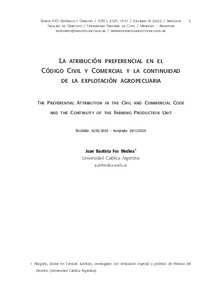Por favor, use este identificador para citar o enlazar este ítem:
https://repositorio.uca.edu.ar/handle/123456789/11432| Título: | La atribución preferencial en el Código Civil y Comercial y la continuidad de la explotación agropecuaria The preferential attribution in the Civil and Commercial Code and the continuity of the farming production unit |
Autor: | Fos Medina, Juan Bautista | Palabras clave: | SUCESIONES; DERECHO SUCESORIO; CODIGO CIVIL Y COMERCIAL; EXPLOTACIONES AGRARIAS; EMPRESA FAMILIAR | Fecha de publicación: | 2020 | Editorial: | Universidad Nacional de Cuyo. Facultad de Derecho; Argentina | Cita: | Fos Medina, J. B. La atribución preferencial en el Código Civil y Comercial y la continuidad de la explotación agropecuaria [en línea]. Revista República y Derecho. 2020, 6. Disponible en: https://repositorio.uca.edu.ar/handle/123456789/11432 | Resumen: | Resumen:
La atribución preferencial del establecimiento ha sido incorporada en el Código
Civil y Comercial argentino en 2015 y reconoce antecedentes en el Derecho civil francés y similitudes con otras instituciones del Derecho Comparado, destinados a una amplia
protección y conservación del patrimonio familiar. Es un modo excepcional de la partición hereditaria que permite la atribución del establecimiento agropecuario (en el caso de estudio)
a uno o a varios herederos, debiendo el/los adjudicatario/s, en caso de corresponder, compensar en dinero a los demás coherederos el mayor valor del establecimiento por sobre
el monto de su porción hereditaria. El instituto posee una función familiar, al conservar
la finca en cabeza de uno o de varios herederos, así como una función económica, porque
permite la continuidad de la actividad económica de la unidad agraria familiar. Tiene la
virtud que mitiga la implacable división forzosa e igualitaria de los bienes hereditarios,
que conduce a la pulverización de la propiedad rural. Abstract: The preferential attribution of the establishment to one or more heirs, has been incorporated into the Argentine Civil and Commercial Code in 2015. It recognizes its background in French civil law, and presents similarities with other institutions of Comparative Law. It offer broad protection to the family patrimony. It is an exceptional mode of hereditary partition that allows the attribution of the agricultural establishment (in the case of study) to one or more heirs. In return, the heir awardee, if applicable, must compensate the other co–heirs, in money, the greater value of the establishment over the amount of its inheritance portion. The institute has a family function, by keeping the farm at the head of one or more heirs, as well as an economic function, because it allows the economic activity to continue. It also mitigates the negative impacts of the equal division of hereditary assets, which leads to the pulverization of rural property. |
URI: | https://repositorio.uca.edu.ar/handle/123456789/11432 | ISSN: | 2525–1937 (online) 2545-5982 |
Disciplina: | DERECHO | Derechos: | Acceso abierto | Fuente: | Revista República y Derecho Vol.6, 2020 |
| Aparece en las colecciones: | Artículos |
Ficheros en este ítem:
| Fichero | Descripción | Tamaño | Formato | |
|---|---|---|---|---|
| atribucion-preferencial-codigo-civil-comercial.pdf | 146,23 kB | Adobe PDF |  Visualizar/Abrir |
Visualizaciones de página(s)
591
comprobado en 30-abr-2024
Descarga(s)
2.337
comprobado en 30-abr-2024
Google ScholarTM
Ver en Google Scholar
Este ítem está sujeto a una Licencia Creative Commons

